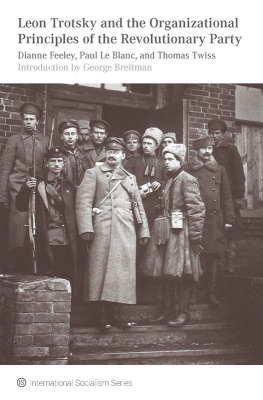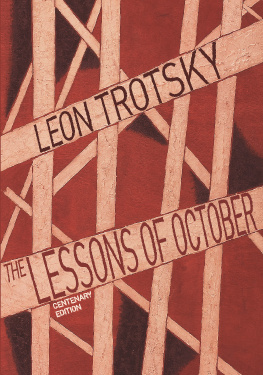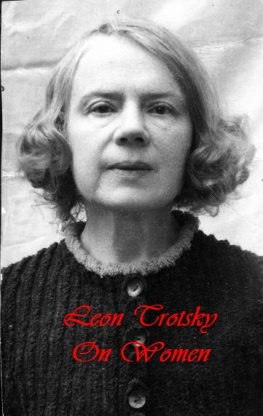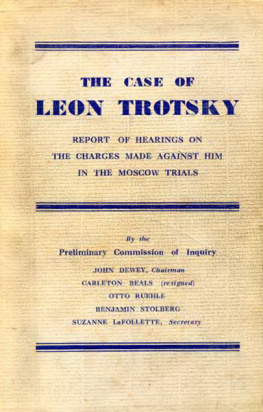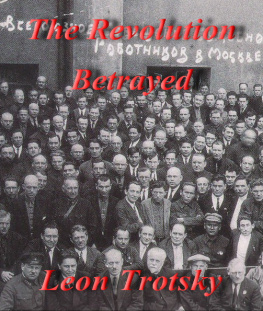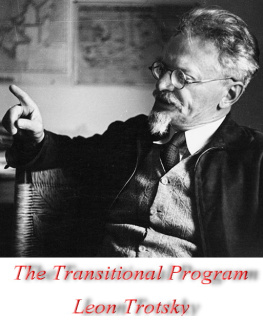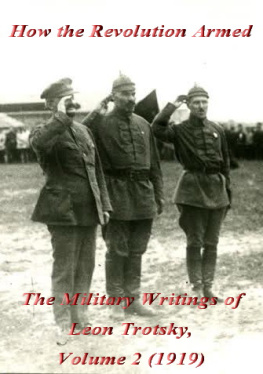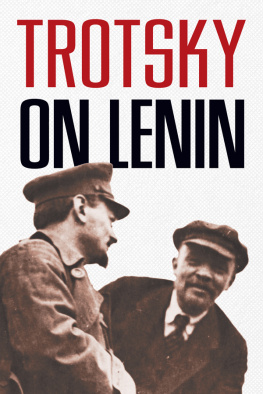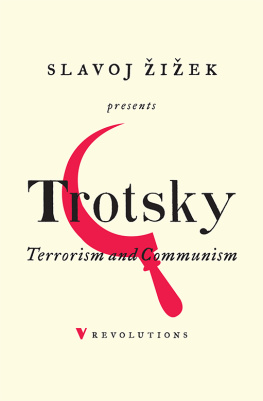Contents

2014 Dianne Feeley, Paul Le Blanc and Thomas Twiss
Published in 2014 by
Haymarket Books
P.O. Box 180165
Chicago, IL 60618
773-583-7884
info@haymarketbooks.org
www.haymarketbooks.org
ISBN: 978-1-60846-455-5
Trade distribution:
In the US through Consortium Book Sales and Distribution, www.cbsd.com
In the UK, Turnaround Publisher Services, www.turnaround-uk.com
In Canada, Publishers Group Canada, www.pgcbooks.ca
All other countries, Publishers Group Worldwide, www.pgw.com
Special discounts are available for bulk purchases by organizations
and institutions. Please contact Haymarket Books for more information
at 773-583-7884 or info@haymarketbooks.org.
Cover design by Josh On.
Library of Congress CIP data is available.
10 9 8 7 6 5 4 3 2 1
Prefatory note from the authors
2010
This is a compilation, produced more than a quarter of a century ago, from the writings of Leon Trotsky. It is a survey of ways that Trotsky understood the organizational perspectives associated with a distinctively revolutionary current that arose in the Russian socialist movement, the Bolsheviks, under the leadership of Vladimir Ilyich Lenin. It also gives a sense of how Trotsky sought to apply those perspectives to complex and shifting realities, from the Russian Revolution of 1917 down to the year of his death in 1940.
We want to convey to the reader of today the 1982 context in which we produced this document. At the time, there was a political crisis developing in a U.S. revolutionary organization to which we had committed our lives, the Socialist Workers Party. Dianne had joined in 1967. Paul joined the Young Socialist Alliance (YSA), the party youth group in 1972, and the SWP a year later, Tom joined the YSA in 1973 and the SWP in 1976. We were proud of the SWPs revolutionary Marxist traditions, its deep roots in what we felt was the best in the history of U.S. radicalism, and especially in the struggles of our own timeagainst the Vietnam war, against racism, for womens liberation, for gay and lesbian rights, in opposition to the environmental degradation of our planet, and especially for the struggles of the working-class majority to defend its living and working conditions andeventuallyto place the economic resources and institutions of society under the democratic control of its people. We were proud of the role played by the early leaders of the SWPpeople like James P. Cannon, Rose Karsner, Vincent Raymond Dunne, Antoinette Konikow, Farrell Dobbs, Joe Hansen, George Breitman, and othersin the struggles of the working class during the first six decades of the twentieth century. We were inspired that a transition was taking place in the 1970s to a younger leadership layer, whose central figure was part of our own generation, Jack Barnes.
With the end of the Vietnam war, however, it was not clear what the SWP might continue to do that would enable it to play a leadership role in other mass movements. Nor was it clear what mass movements might be in the offing. A decision to break up large branches in order to establish smaller community branches turned out to be an unmitigated flop. A turn to the working classgetting more and more comrades into union jobs, especially in industrial occupationsseemed promising to many of us, but certainly did not replicate the impact on political realities that the SWP had appeared to enjoy in the earlier anti-war movement. This seemed to be contrary to the expectation that the 1960s radicalization among students and youth would inexorably embrace the entire working class in the 1970s and 1980s.
After a brief period of apparent uncertainty, the new leadership embarked on a dramatic new coursealthough Barnes and his co-thinkers were carrying this out in the name of revolutionary continuity. Nonetheless, Barnes and those around him were quietly but increasingly distancing themselves from the traditional Trotskyist perspectives that had guided the SWP, replacing that with an uncritical attitude toward the leadership of the Cuban Communist Party led by Fidel Castro. An internal educational campaign was initiated to read Leninand to read Lenin in the correct wayin order to achieve a correct political orientation consistent with the shift away from Trotsky. And in the name of Leninism and democratic centralism, the new leadership was also suppressing internal democracy.
Although it did not occur to us at the time, it seems that it was important to those in the Barnes leadership that they remain in leadership positions no matter whatwhich required that they tighten up the organizational norms more than ever, because some of their comrades might question what appeared to be a certain amount of political flailing about. Some would certainly not go along with their junking of the old concepts that had guided the organization.
Even before the early 1980s, when this development transformed the SWP, we had been taught to accept a more restrictive understanding of Leninist norms than any of us would accept today. Uncomfortable with increasing organizational restrictions in the late 1960s, the retired leader of U.S. Trotskyism, James P. Cannon, had warned: dont strangle the party in a communication to the SWP leadership, but was basically ignored. In a factional dispute in the mid-1970s, party norms had been further tightened when a dissident current was de-registeredwhich amounted to being thrown out of the SWP without a trial. But now the SWPs political line could change overnight, with few daring to question these changesin regard to such things as the Russian invasion of Afghanistan, or the Polish workers struggling for their rights, or the increasingly draconian pressures to force all SWP members into industrial jobs, while abandoning a variety of social movements, pulling out of union jobs among teachers and service workers, etc. This intensified industrialization policy (referred to as the turn within the turn) was also forced on the Young Socialist Alliance, with the motivation that the student movement was deadalthough in reality the student movement was building anti-divestment campaigns on the campuses against South African apartheid, involving itself in Central America solidarity efforts, and pushing against cut-backs and tuition hikes.
Barnes loyalists were becoming increasingly aggressive in party branches such as ours in Pittsburgh. Those of us who clearly disagreed with what was happening had to watch our step, and we were removed from all but the most limited internal assignments, watched closely by the loyalists who were on the lookout for disciplinary infractions. Party norms began to generate an atmosphere that felt claustrophobic and coldit was like living in a refrigeratorwith a growing number of our comrades afraid to talk with us when we even timidly raised questions or made suggestions about areas of work where we might work with other leftists. But the hard loyalists didnt seem to be afraid, and explained behind our backs as well as at branch meetings that not only were we wrong, but we were bourgeois intellectuals with no roots in the working class.
Actually, the three of us were from working-class families and supported ourselves proletarian-style by selling our ability to work for a paycheck. We were part of a current in the SWP that was committed to having a full-scale democratic discussionin order to struggle for a more honest and open way of functioning, consistent with the Trotskyist perspectives to which we had been recruited in the 1960s and 1970s. We wanted to stay in the party in order to fight for its future as a revolutionary force, hopefully by waking up our comrades and winning them to our ideas. According to the SWP constitution, there was supposed to be a pre-convention discussion in the months leading up to the 1983 national convention, with written documents to be published in pre-convention discussion bulletins as well as organized branch discussions. At the request of George Breitman (1916-1986), we agreed to prepare Leon Trotsky and the Organizational Principles of the Revolutionary Party. He proposed that it be prepared for the SWPs National Education Department as an educational bulletinand, if it was ignored or rejected (it was ignored), it could be one of the documents that would be printed in the pre-convention discussion bulletins. (Another piece of writing produced under Breitmans influence at this time was Paul Le Blancs book Lenin and the Revolutionary Party .)


